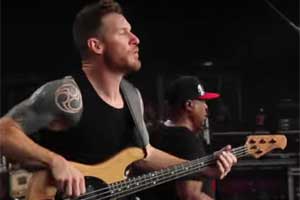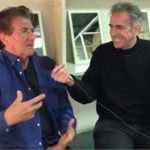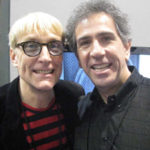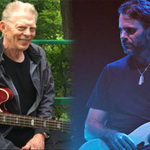Rage Against the Machine, Audioslave bassist talks history, influences and new Future User project
Exclusive interview with FBPO’s Gary Graff
June 15, 2015
Tim Commerford cemented his place in bass playing iconography with Rage Against The Machine, introducing a, well, raging but also melodically complex style that brought together elements of metal, prog rock, funk and hip-hop into a death-defying approach that, when it worked best (which was often) left listeners’ jaws on the floor.
Commerford showed he could simplify things, but still retain that impressive power during the six-year run of Audioslave, which he and Rage mates Tom Morello and Brad Wilk formed with Soundgarden’s Chris Cornell for a two-album stint. Audioslave has been on ice since 2007 and Rage since 2011, though the latter has not broken up.
But Commerford isn’t twiddling his thumbs waiting for either to restart; instead he’s formed Future User, a prog-meets-metal project he began with friend and onetime neighbor Jordan Tarlow, with Grammy award-winning producer Brendan O’Brien playing guitar and Commerford adopting an alias called S.W.I.M. for Future User’s provocative music videos – which co-star tennis champ John McEnroe and cyclist Lance Armstrong. Future User’s seven-song debut, #steroidsorheroin, is just out, and in a wide-ranging conversation Commerford tells us there’s more where that came from.
FBPO: So how did you become a bass player?
TC: When I was a kid, when I first started listening to music, one of the first bands that I loved before I started playing music was KISS, and I had that KISS ALIVE II record and that picture of Gene Simmons on the inside, where he’s just got blood all over his face and his tongue out and his face is all sweaty and his makeup’s dripping off…To this day, occasionally I’ll go on the computer and I’ll just put in KISS ALIVE II and just look at that picture. And I was just like, “Wow, man, this is sick. That guy is so cool!” So I was immediately drawn to the bass player even before I played bass.
FBPO: I bet there aren’t many people who would have pegged KISS as the starting point for Rage Against The Machine’s bass player.
TC: Well, after that, the band that inspired me to want to play music was the Sex Pistols. Before I realized that Sid Vicious didn’t even play bass on Never Mind The Bollocks, which is the record I really loved, I was exposed to Sid Vicious and, again, I had that same sort of, “Wow, this guy’s awesome! I want to be Sid Vicious!” So I was loving the bass player once again.
And when I got to high school, that’s when I became, like, a prog rock fanatic and my guy was Geddy Lee – (Iron Maiden’s) Steve Harris, but mainly Geddy Lee, and I just loved the way he played the instrument and I feel blessed that I emulated his style of playing. That helped me so much to get the sounds I’ve gotten throughout my career in all the music I’ve made.
FBPO: Did the support role of a bass player appeal to you, too?
TC: Oh, yeah. I’m a team player and I love the bass in the same way that an offensive lineman on a football team loves blocking people. I love playing bass. I love being on a team and I love building music.
FBPO: You’re a finger player primarily, right?
TC: I don’t play with a pick at all. Chris Squire is the only pick player that I like. I don’t even consider using a pick on the bass as bass playing; that’s more like playing guitar on the bass. But (Squire) had that that kind of pick/thumb together that made this just unbelievable sound. Like “Roundabout,” the bass sound on that is still one of my favorite bass sounds of all time, just the tone of it. But fingers are the only way to fly for me, man. When I first started playing bass, I was a Maiden and Yes and Rush fan and I tried to learn how to play the songs coming off just playing “God Save the Queen” and “Anarchy in the U.K.” to playing “YYZ” and “Red Barchetta” and “Number of the Beast” and shit like that. I couldn’t play with two fingers, so I would use three fingers to play. I played a ton with three fingers as a kid, and that three-finger style was a big part of my playing.
FBPO: When did you start to embrace funkier styles?
TC: When we got together with Rage I was getting into slapping and stuff, but I didn’t want to be the Chili Peppers. And then I started playing with Rage and I was kind of big on Jaco, even though my left hand was never – and never will be – Jaco. But I sort of emulated his right-hand playing, and he had that instructional video where he talked about playing and he only used two fingers. So then I started going, “Y’know what? I just need to build the strength of my two fingers to get them to go as fast as three fingers,” and I got them to go pretty fast. And then as they got faster I realized I could play some stuff with just one finger that I used to use two fingers to play, and I started tapping into that. I figured if I can do it with one finger I can do it even better, like James Jamerson or something like that. As I got more into that I sounded better than ever.
FBPO: Future User, your current group, blends prog and electronic elements. What’s your bass approach to that music?
TC: The tempo’s, like, 140 bpm; that was our template for songs. In order to play 8th notes or 16th notes at 140 bpm, you can’t do it with two fingers; I don’t think there’s a bass player alive who can play that fast for an extended period of time with two fingers, so I had to go back to my roots and go, “OK, I know how to play with three fingers. My ring finger’s actually pretty strong. I can do this.” And I started woodshedding three fingers again and I got it to a point on “Mountain Lion” where I’m like, “Wow, that’s kinda cool.” It’s fast, and it’s been awesome.
FBPO: Is upright bass in your vocabulary at all?
TC: I actually played upright bass for a while. I have two of them. They’re beautiful. But if you wanted to put upright bass on a song, you can’t just go, “Oh, I’m gonna get it out of storage today.” It doesn’t work like that. It’s a sport. It takes muscles that need to get developed and practice every day. I did that for a while; I took lessons and I learned how to play with a bow and really practiced and tried to learn how to become a decent upright player. I don’t even know if I got to that point, but I got to a point where I could move around on the instrument to play. And then I brought it to a Rage rehearsal – this is years ago – and I was like, “Yeah, let’s put this on a song” and plugged it into an amp, turned it on and it immediately started this low-end feedback and it blew the whole front of the bass, like the feedback got inside the bass and blew the front of the bass off the body. So it lasted all of five minutes and it was just destroyed and I had to have it repaired. And it has since gone back into storage.
FBPO: So how did Future User come together?
TC: The origins of it started when I was in Audioslave and I had a house that needed some work and I rented a place right next to my partner, Jordan. He had a studio, like, two houses away so I got to know Jordan and, way back, like in 2000, we discussed, “Hey, we should one day get together and do some music.” And it took quite a few years and we finally got together and sort of tapped into a mutual love of progressive rock and we got together and started making, like, electronic prog. We were kind of interested in the whole electronic movement that was happening and we were like, “Wow, let’s do something and incorporate prog rock and electronica and programming with real playing and see what comes out of it,” and that’s where we are today.
FBPO: You have Brendan O’Brien playing guitar on #steroidsorheroin. That’s quite a coup.
TC: We went into the project with sort of like an EDM (electronic dance music) mentality of, “We’re not gonna use guitar and we’re only gonna use the keyboards and the computer to be the ultimate prog musician. We’re just gonna tap into this superhuman aspect of the computer and just create what the guitar might do with programming and whatnot. And we had done that.
FBPO: The ultimate revenge of the bass players.
TC: Oh, totally, man. [Laughs] I wanted to put a little guitar down on the artwork with a little circle and line through it, like, “No guitar players allowed.” That was my initial idea, but it didn’t work out that way.
FBPO: So why did you cave?
TC: [Laughs] We wrote a bunch of songs that were all vocals and everything and I went and played it for Brendan, who produced two Rage records, Evil Empire and Battle of Los Angeles, and he also produced one Audioslave record. I love the guy; he’s so fun to be around and such a great person, but he first and foremost is the most incredible musician I’ve ever been around, and he’s like the best guitar player. I love Tom Morello and he’s such an innovator and he does some amazing stuff, but Brendan is the complete package. He can play any style, and he too grew up on prog rock. He can play any Zeppelin song, any Yes song, any song from the classic rock era front to back, note-for-note, exactly as it was played. He has a photographic memory.
So I played him the music and he really dug it and I was like, “Hey, would you be willing to help me?” He was, “Sure. What do you want me to do?” and I was like, “Come play guitar” and he’s like, “Alright, I’ll be there tomorrow” and he came to play guitar and that was a eureka moment where I was like, “OK, maybe I didn’t want guitar on the music, but it does something to the music that makes me feel complete.” So he ended up playing on all the songs, and here we are.
FBPO: Future User is very much a studio project. Will you play live?
TC: We don’t know. We haven’t yet, but none of this was thought out before we started. Right now we’re just putting out music and we’re laying a foundation and making some prog in a very non-prog world. We wrote tons of songs and we have tons of stuff; these happen to be the first seven that we finished, and we have a bunch we’ve finished since then, so we have tons of music. I have plans of continuing to put out songs and videos and hopefully go on tour and take it on the road and tap into some of that earth-shaking EDM technology that they have and blending that again with real musicianship.
And this is not the only thing I have in my little bag of tricks. I have another thing I’ve been working on hard that I won’t go into detail about, but it sort of sits on the other end of the spectrum of what I’m doing with Future User.
FBPO: Is there a certain pressure you feel when you do something now? Rage and Audioslave set a pretty high bar of expectation.
TC: Well, there’s always going to be haters. [Laughs] There’s gonna be haters and there’s gonna be people who dig it and you’re never going to be able to satisfy everyone. And one thing I’m proud of is that I never, whether you look at it as transitioning from Rage to Audioslave or going from Audioslave to what I’m doing now – I’m not interested in doing the same thing twice, that’s for sure. I want to always play a different style of music that I haven’t played before because I love so many different styles of music.
FBPO: Any updates about Rage doing something again?
TC: We don’t talk about anything, but we never have talked about anything. That’s not what we do. We’re still a band and I always have hopes that something could happen, someone could need us to help support some cause or something like that could be the catalyst for us to play again. But you never know…the last show we did was at the Coliseum in Los Angeles (July 30, 2011); that’s a pretty iconic venue. They had the Olympics there. It’s just an incredible place and we played there and there were thousands and thousands and thousands of people there and it was an incredible show, and if that was the last show we played that’s a pretty great way to go out.
FBPO: Would Audioslave ever consider getting back together or is that over and out?
TC: Maybe. You never know. We really get along well, and Tom and Chris and I played not long ago in Seattle and played some Audioslave tunes with other musicians. And I still talk to Chris all the time and we talk about that. So that could happen. I really look at Audioslave as a band that, more so than Rage or even Soundgarden, where when we’re 50 years old it might be easier to play “Like a Stone” than, say, “Killing in the Name” or “Jesus Christ pose,” you know what I’m saying? So, yeah, Audioslave is a band that probably could happen again someday.







That’s nice…inspired to play by Gene Simmons and Sid Vicious, and a total pick snob. Makes all the sense in the world to me.